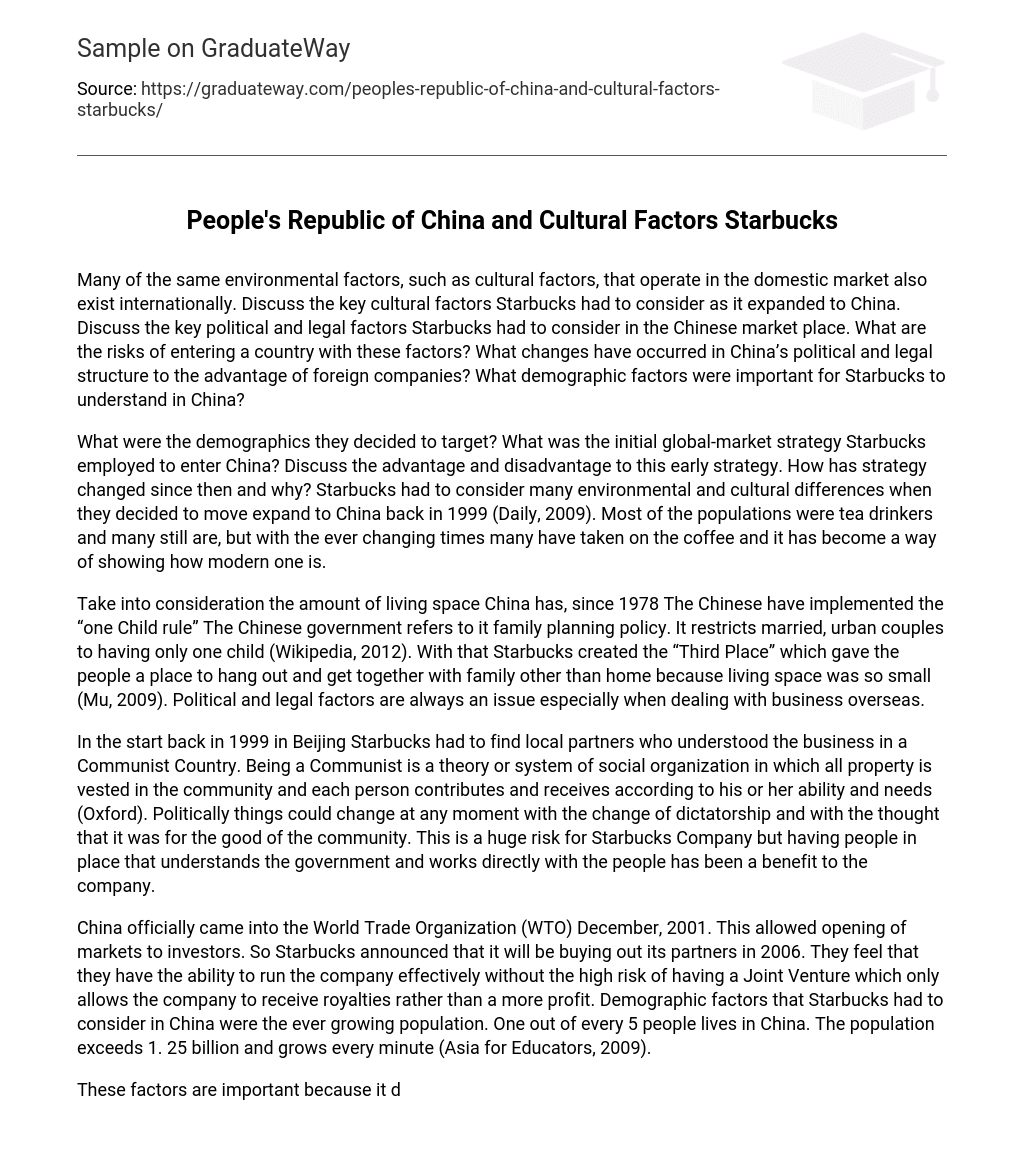Many of the same environmental factors, such as cultural factors, that operate in the domestic market also exist internationally. Discuss the key cultural factors Starbucks had to consider as it expanded to China. Discuss the key political and legal factors Starbucks had to consider in the Chinese market place. What are the risks of entering a country with these factors? What changes have occurred in China’s political and legal structure to the advantage of foreign companies? What demographic factors were important for Starbucks to understand in China?
What were the demographics they decided to target? What was the initial global-market strategy Starbucks employed to enter China? Discuss the advantage and disadvantage to this early strategy. How has strategy changed since then and why? Starbucks had to consider many environmental and cultural differences when they decided to move expand to China back in 1999 (Daily, 2009). Most of the populations were tea drinkers and many still are, but with the ever changing times many have taken on the coffee and it has become a way of showing how modern one is.
Take into consideration the amount of living space China has, since 1978 The Chinese have implemented the “one Child rule” The Chinese government refers to it family planning policy. It restricts married, urban couples to having only one child (Wikipedia, 2012). With that Starbucks created the “Third Place” which gave the people a place to hang out and get together with family other than home because living space was so small (Mu, 2009). Political and legal factors are always an issue especially when dealing with business overseas.
In the start back in 1999 in Beijing Starbucks had to find local partners who understood the business in a Communist Country. Being a Communist is a theory or system of social organization in which all property is vested in the community and each person contributes and receives according to his or her ability and needs (Oxford). Politically things could change at any moment with the change of dictatorship and with the thought that it was for the good of the community. This is a huge risk for Starbucks Company but having people in place that understands the government and works directly with the people has been a benefit to the company.
China officially came into the World Trade Organization (WTO) December, 2001. This allowed opening of markets to investors. So Starbucks announced that it will be buying out its partners in 2006. They feel that they have the ability to run the company effectively without the high risk of having a Joint Venture which only allows the company to receive royalties rather than a more profit. Demographic factors that Starbucks had to consider in China were the ever growing population. One out of every 5 people lives in China. The population exceeds 1. 25 billion and grows every minute (Asia for Educators, 2009).
These factors are important because it determines taste, trends, values and beliefs of an individual. With the growing population and the changing times Starbucks had to target 20-40 year olds locally called “Chuppies”. They account for about 7% of Chinas population which numbers in over 100 million (Fitz-Gerald, 2009). This would give any investor an advantage focusing on young aspiring individuals with money and still live with parents, but also have no debt. Starbucks initial global strategy is to use different types of owner structures, they either used authorized a local developer or set up a joint venture.
The advantage of doing this got them into the country to sell the product with little risk because they had someone who understood the government taking care of the business. The disadvantage was profits, all the company received were royalties until China came into the WTO. It’s different now that investors are able to trade with fewer restrictions than before. Starbucks now buys companies and puts people in charge on the company’s behalf. To help with the growth of the company Starbucks appointed executives in Shanghai and they report to the US headquarters. With the population of China continuing to grow and with the Country in the WTO the possibilities are limit less. Starbucks has expanded all over the world and will continue to grow as long as they follow the same practices they put in place like the ones in China.
Bibliography
Asia for Educators. (2009). Retrieved 10 24, 2012, from Columbia. edu: http://afe. easia. columbia. edu/special/china_1950_population. htm Daily, C. (2009, Feb 05). Starbucks coffee market. Retrieved October 22, 2012, from www. whatsonxiamen. com/wine_msg. php? titleid=422 Fitz-Gerald, K. 2009, 01 27). jutiagroup. Retrieved 10 24, 2012, from jutiagroup. com: http://jutiagroup. com/20090127-profiting-from-chinas-%e2%80%9cchuppies%e2%80%9d/ Mu, M. S. (2009, December 13). Alibaba. Retrieved October 22, 2012, from http://news. alibaba. com/article/detail/business-in-china/100216209-1-all-coffee-china. html Oxford. (n. d. ). Answers. com. Retrieved October 12, 2012, from http://www. answers. com/topic/communism Wikipedia. (2012, october 22). Wikipedia. Retrieved october 22, 2012, from en. wikipedia. org/wiki/One-child_policy





